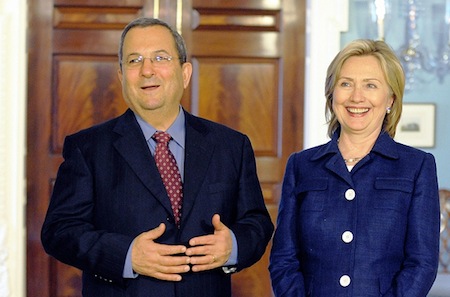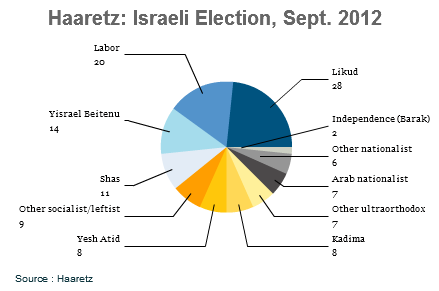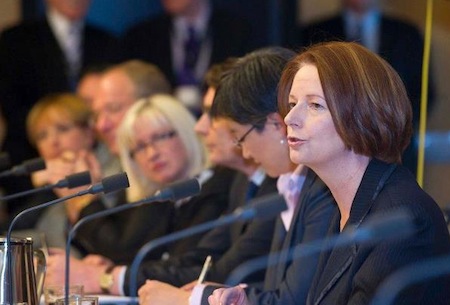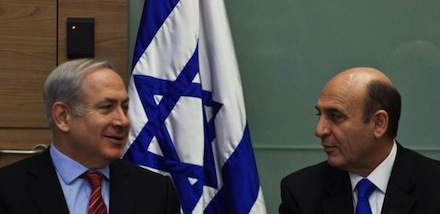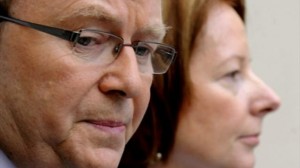Israeli defense minister — and prime minister from 1999 to 2001 — Ehud Barak announced earlier this week that he would not be contesting Israel’s Knesset elections on January 22. ![]()
Although he’ll stay on as defense minister until a new government is formed, Barak’s departure, at age 70, appears to end what has been a long and twisty career in Israeli politics — there remains a chance, however, that prime minister Benjamin Netanyahu could re-appoint Barak (pictured above with U.S. secretary of state Hillary Clinton) as defense minister from outside the Knesset if Netanyahu forms the next government. That outcome, by the way, seems more than plausible, given Barak’s longtime impatience with parliamentarian politics.
A longtime veteran of the Israeli Defense Force and its most decorated veteran (his most famous exploit in Israel’s elite special forces was a commando raid against Palestinians dressed incognito in high heels and a wig), Barak entered politics in 1995 as foreign minister in Shimon Peres’s government and after Peres lost the 1996 Israeli election to Netanyahu, Barak became the leader of Israel’s Labor Party (מפלגת העבודה הישראלית).
His political career has been a bit schizophrenic — he won, overwhelming, a race to become prime minister, but he’s more often than not been relatively unsuccessful and unloved in Israeli politics.
In the 1999 direct prime ministerial election, Barak defeated Netanyahu by 56% to 44%. As prime minister, he oversaw Israel’s withdrawal from southern Lebanon (after more than two decades of occupation) and engaged in the most serious negotiations since 1993 with the Palestinian Liberation Organization (نظمة التحرير الفلسطينية), then still under the leadership of Yasser Arafat, culminating in the Camp David summit in 2000 that nearly succeeded in bringing about a peace accord between Israel and the PLO — last week’s Israeli attack on Gaza, masterminded by Barak himself, was a depressingly clear sign that Israeli-Palestinian relations, at least with respect to Gaza, have worsened in the past 12 years.
Barak lost the 2001 election to Likud’s then-leader Ariel Sharon in the wake of the failure of the PLO talks. He aborted an early attempt to return to the Labor leadership in 2005 (Barak ultimately backed Peres in that year’s leadership race, who lost to Amir Peretz), but won the Labor leadership in 2007 and became defense minister in 2007 under then-prime minister Ehud Olmert. Although Labor won just 13 seats in the 2009 election — the lowest-ever total for Labor or its predecessor — Barak has continued as defense minister under Netanyahu. Barak’s continued presence in the Netanyahu government wasn’t without controversy within Labor and in 2011, he left Labor altogether to form his own pro-Netanyahu faction, Independence (סיעת העצמאות), comprised of Barak and four other former Labor MKs.
Shelly Yachimovich was elected Labor’s leader in March 2011 and has led the party very much in opposition to Netanyahu, and Yachimovich is generally seen as the chief opposition leader to Netanyahu going into the elections (although she has some competition from political newcomer Yair Lapid and former Kadima leader Tzipi Livni).
Even as relations between the U.S. government under president Barack Obama and Netanyahu remain strained over Iran — and now over Gaza — Barak has long been widely respected by U.S. policymakers as a thoughtful voice within Israel’s government. Although he has sounded the alarm louder than anyone in Israel’s government over the threat of an Iranian nuclear program, Barak is thought to be a moderating force with respect to any future attack on Iran.
Most immediately, Barak’s departure means that if Netanyahu wins the Jan. 22 elections, as expected, and Barak does not continue as defense minister, it will result in the amplification of relatively more hawkish voices of allies such as Avigdor Lieberman, Netanyahu’s foreign minister and leader of the Yisrael Beiteinu (ישראל ביתנו, ‘Israel is Our Home’) party that recently merged with Netanyahu’s Likud (הַלִּכּוּד) for purposes of the upcoming elections. It would also mean that yet another figure with the gravitas of a former Israeli prime minister — and a figure who carries Netanyahu’s trust and respect — will no longer be around to counterbalance Netanyahu: Continue reading What Barak’s apparent departure means for Israeli politics
